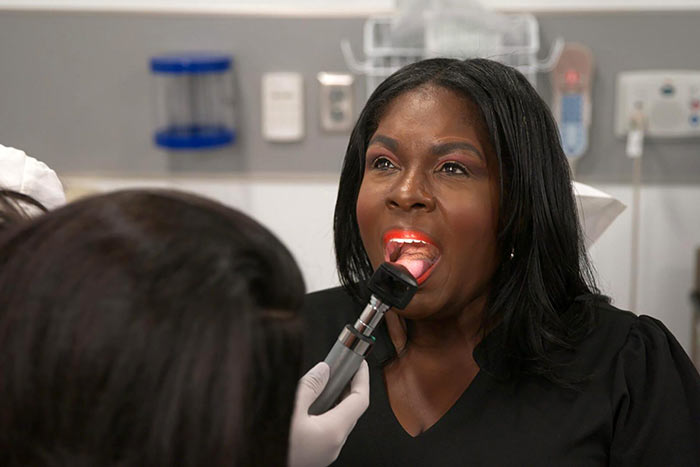Patients are likely to have multiple doctors from a variety of disciplines, though each of them also is an expert in head and neck cancer. In this collaborative care model, all of these doctors work together to evaluate the patient’s diagnosis, consult on their treatment plan and coordinate all aspects and stages of their care. By pooling their expertise, doctors can make the best decisions and give patients the most comprehensive advice and information. This approach also ensures that the patient will receive the ideal combination and sequence of treatment for their individual needs.
Care team members also take an active role in their patients’ care. Patients often don’t know how, or to whom, they need to provide information. Winship helps to make this process easier. “Even before they have their appointment,” says El-Deiry, “we reach out to patients asking, for example, how we can help get their scans or slides.” He says this kind of personalized advocacy “was one of the guiding principles of this clinic, which predated and led to ‘The Winship Way.’”
The Winship Way has improved patient outcomes for head and neck cancer patients by making patients themselves everyone’s central focus. Most of the 15 to 20 new cases of head and neck cancer evaluated weekly in Winship’s head and neck cancer clinic are referred by their doctors. If you are one of them, you can be assured you came to the right place because, El-Deiry says, “studies have shown that survival outcomes are statistically, significantly better for patients cared for in a high-volume multidisciplinary center” like Winship.
What Causes Cancers of the Head and Neck?
According to the National Cancer Institute, alcohol and tobacco use (including secondhand smoke and smokeless tobacco, also known as “chewing tobacco” or “snuff”) are the two most important risk factors for head and neck cancers—especially cancers of the oral cavity, hypopharynx and voice box (larynx). Using both alcohol and tobacco puts you at even greater risk than using either one alone.
Infection with types of human papillomavirus (HPV), especially HPV type 16, is a risk factor for cancers of the tonsils or base of the tongue. The NCI says the incidence of HPV-related oropharyngeal cancers is increasing. Three-quarters of all oropharyngeal cancers are caused by chronic HPV infection. It’s important to stress that HPV vaccination is highly effective at preventing these cancers.
The NCI notes other known risk factors, including the use of paan (betel quid) in the mouth, a common custom in Southeast Asia. Those of Asian (particularly Chinese) ancestry have a higher risk for nasopharyngeal cancer. Occupational exposure to wood dust is a risk factor for nasopharyngeal cancer. Radiation exposure is a risk factor for cancer of the salivary glands. Epstein-Barr infection is a risk factor for nasopharyngeal cancer. There are also underlying genetic disorders that heighten someone’s risk.
Symptoms To Look Out For
The symptoms of head and neck cancer may include:
- A lump in the neck
- A sore in the mouth or throat that doesn’t heal and may be painful
- A sore throat that doesn’t go away
- Difficulty in swallowing
- A change or hoarseness in the voice
Of course, there may be less serious explanations for these conditions, but it’s important to check with a doctor or dentist about your concerns.
How To Reduce Your Risk for Head and Neck Cancers
The number-one way to reduce your risk is to stop using tobacco — and don’t start. Avoiding HPV infection can reduce the risk of HPV-associated head and neck cancers. The HPV vaccine Gardasil 9 is highly effective in preventing oropharyngeal and other head and neck cancers caused by HPV types 16, 18, 31, 33, 45, 52 and 58 in people aged 9 through 45 years. Most doctors don’t routinely screen for head and neck cancers, though dentists may check the oral cavity for signs of cancer during a routine checkup.
What To Do if You Have, or May Have, Head and Neck Cancer
Head and neck cancers account for nearly 4% of all cancers in the United States. They are more than twice as common among men as they are among women. They are diagnosed most often among people over age 50.
If you have symptoms that make you suspect something is going on, it’s best to see your primary doctor. If they determine you need further examination, you will be referred to a specialist who can conduct tests that will determine whether or not you have head and neck cancer. You may then be referred to us at Winship.
Once you are in our care, Winship’s multidisciplinary teams and patient advocacy make sure that your job is simply to be cared for. “I can’t overstate the value of those two principles,” says El-Deiry.




